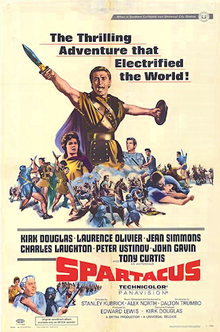
Back Spartacus (cinta de 1960) AN سبارتاكوس (فيلم) Arabic سبارتاكوس (فيلم) ARZ Spartak (film, 1960) Azerbaijani ایسپارتاکوس (فیلم) AZB Спартак (филм) Bulgarian স্পার্টাকাস (চলচ্চিত্র) Bengali/Bangla Espàrtac (pel·lícula de 1960) Catalan Spartakus (film, 1960) Czech Spartacus (film) Danish
| Spartacus | |
|---|---|
 Theatrical re-release poster (1967) | |
| Directed by | Stanley Kubrick |
| Screenplay by | Dalton Trumbo |
| Based on | Spartacus 1951 novel by Howard Fast |
| Produced by | Edward Lewis |
| Starring | |
| Cinematography | Russell Metty |
| Edited by | Robert Lawrence |
| Music by | Alex North |
Production company | |
| Distributed by | Universal International |
Release date |
|
Running time | 197 minutes |
| Country | United States |
| Language | English |
| Budget | $12 million[1][2] |
| Box office | $60 million (initial release) |
Spartacus is a 1960 American epic historical drama film directed by Stanley Kubrick and starring Kirk Douglas in the title role, a slave who leads a rebellion against Rome and the events of the Third Servile War. Adapted by Dalton Trumbo from Howard Fast's 1951 novel of the same title,[3] the film also stars Laurence Olivier as Roman general and politician Marcus Licinius Crassus, Charles Laughton as Sempronius Gracchus, Peter Ustinov as slave trader Lentulus Batiatus, and John Gavin as Julius Caesar. Jean Simmons played Spartacus' wife Varinia, a fictional character, and Tony Curtis played the fictional slave Antoninus.
Douglas, whose company Bryna Productions was producing the film, removed original director Anthony Mann after the first week of shooting. Kubrick, with whom Douglas had made Paths of Glory (1957), was brought on board to take over direction.[4] It was the only film directed by Kubrick where he did not have complete artistic control. Screenwriter Dalton Trumbo was blacklisted at the time as one of the Hollywood Ten. Douglas publicly announced that Trumbo was the screenwriter of Spartacus, and President John F. Kennedy crossed American Legion picket lines to view the film, helping to end blacklisting;[5][6][7] Howard Fast's book had also been blacklisted and he had to self-publish the original edition.
The film won four Academy Awards (Best Supporting Actor for Ustinov, Best Cinematography, Best Art Direction and Best Costume Design) from six nominations. It also received six nominations at the Golden Globes, including Woody Strode‘s only career Golden Globe nomination (for Best Supporting Actor), ultimately winning one (Best Motion Picture – Drama). At the time of the film’s release, it was the biggest moneymaker in Universal Studios' history, which it remained until it was surpassed by Airport (1970).[8]
In 2017, it was selected for preservation in the United States National Film Registry by the Library of Congress as being "culturally, historically, or aesthetically significant."[9]
- ^ "Spartacus (1960) – Financial Information". The Numbers. Retrieved December 24, 2014.
- ^ "M-G-M Cashing in on Oscar Victory". The New York Times. April 7, 1960. p. 44.
- ^ "Spartacus". TCM database. Turner Classic Movies. Retrieved February 29, 2016.
- ^ Kirk Douglas. The Ragman's Son (Autobiography). Pocket Books, 1990. Chapter 26: The Wars of Spartacus.
- ^ Cite error: The named reference
fiuwas invoked but never defined (see the help page). - ^ "Kennedy Attends Movie in Capital" (PDF). New York Times. February 4, 1961. Retrieved January 20, 2012.
- ^ "THE FRONTS COME FORWARD". Chicago Tribune. November 27, 1992. Retrieved July 10, 2022.
- ^ Link, Tom (1991). Universal City-North Hollywood: A Centennial Portrait. Chatsworth, CA: Windsor Publications. p. 87. ISBN 0-89781-393-6.
- ^ "2017 National Film Registry Is More Than a 'Field of Dreams'". Library of Congress. Archived from the original on December 13, 2017. Retrieved December 13, 2017.
© MMXXIII Rich X Search. We shall prevail. All rights reserved. Rich X Search